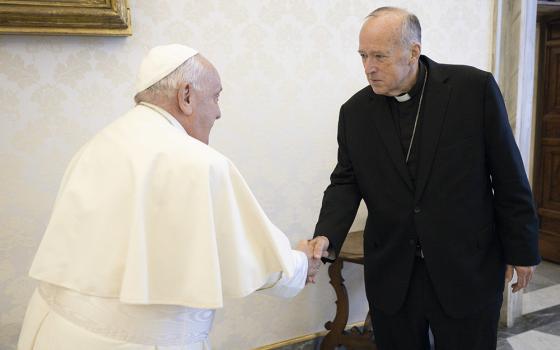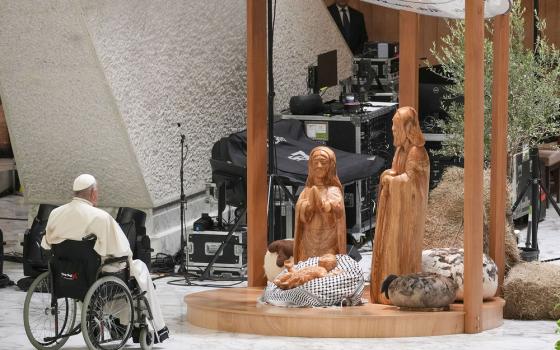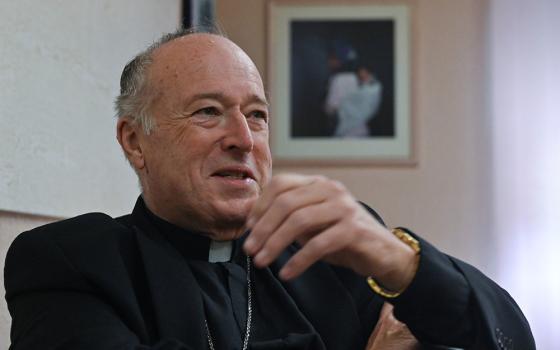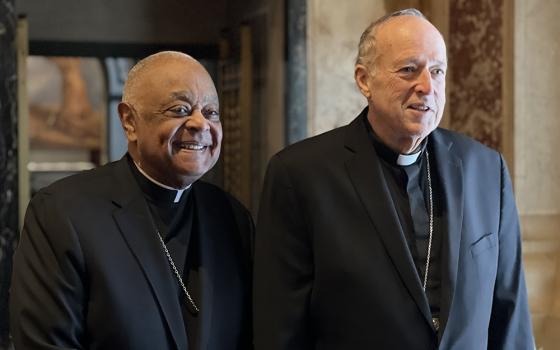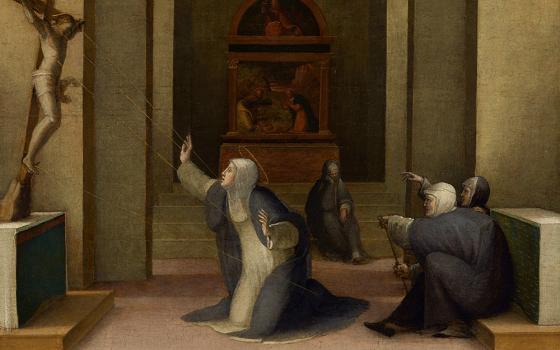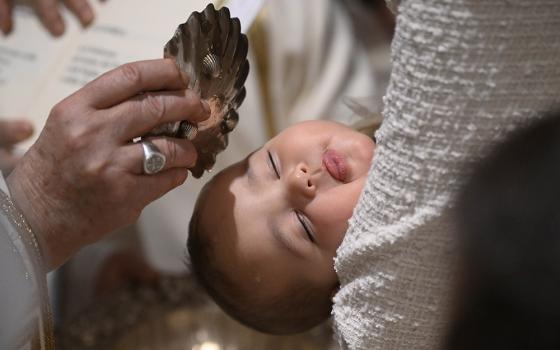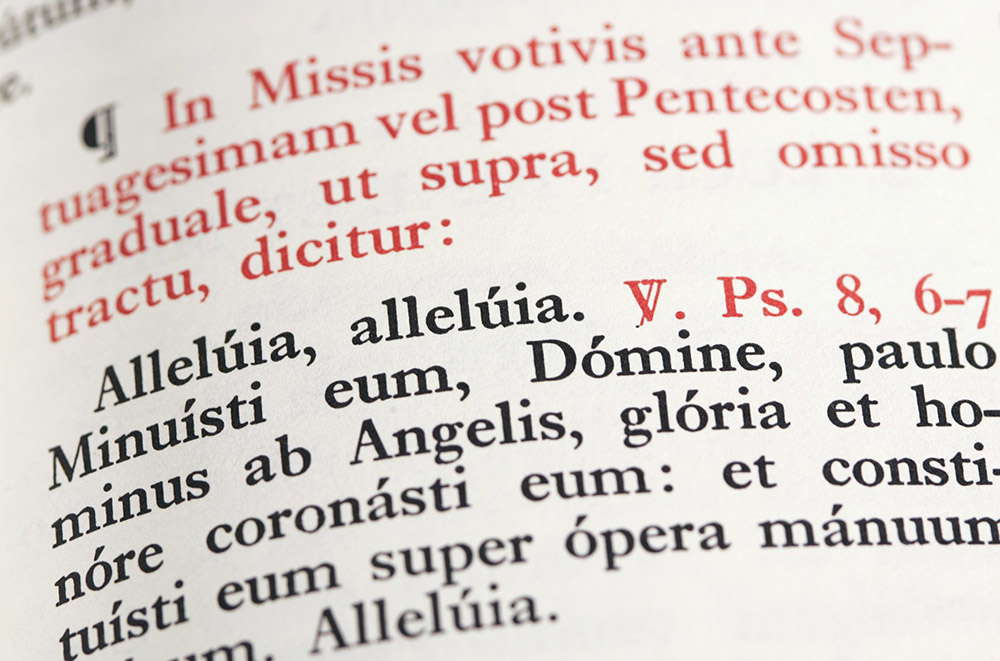
A detail of the Gospel acclamation from a reproduction of the 1962 Roman Missal. Commonly known as the Tridentine Mass, the Mass of this missal is entirely in Latin. (CNS/Nancy Wiechec)
Pope Francis' restoration of restrictions on the traditional Latin Mass was guaranteed to provoke uproar. Many who prefer the old rite (sometimes called the Tridentine Mass, or the extraordinary form) already see the worst in everything Francis does. Others who love both the old rite and the pope find his decision troubling. And still others, fed up with the attitudes of traditionalist Catholics, applaud Francis' crackdown.
I was once a traditionalist, and I support Pope Francis' motu proprio. Nonetheless, I believe that restricting the liturgy was not the best way to deal with the problems in traditionalist communities. A more effective move would have been to put restrictions on the destructive behaviors and ideologies they promote. The traditional Latin Mass is not itself the problem. The problem is that many traditionalist communities embrace and promote ideologies contrary to the Gospel.
When Pope Emeritus Benedict XVI removed the restrictions on the old rite, his purpose was unity. He wanted to extend a hand to older faithful who missed the old Tridentine rite, as well as to younger traditionalists who preferred it. Benedict was even attempting to restore unity with dissident groups. But his decision had the opposite effect. Today, the Roman rite church appears far closer to a schism than it did 15 years ago, when Benedict issued his Summorum Pontificum.
Reactions among traditionalists illustrate this. Cardinal Raymond Burke, posting on his own website, questioned Francis' authority to place restrictions on the rite. And, as was reported here in the National Catholic Reporter, Msgr. Andrew Wadsworth, executive director of the International Commission on English in the Liturgy, compared Francis' motu proprio to "an atomic bomb" and himself to an inmate on death row.
Other Latin Mass devotees were quoted in the far-right publication LifeSiteNews, decrying the pope's move as "cruel," "a terrible blow to Tradition in the church" and, ludicrously, "a declaration of war by cunning forces in the Church that are aligned with the diabolical New World Order." According to one commenter, restricting the older Latin rite "provokes the wrath of Almighty God Himself."
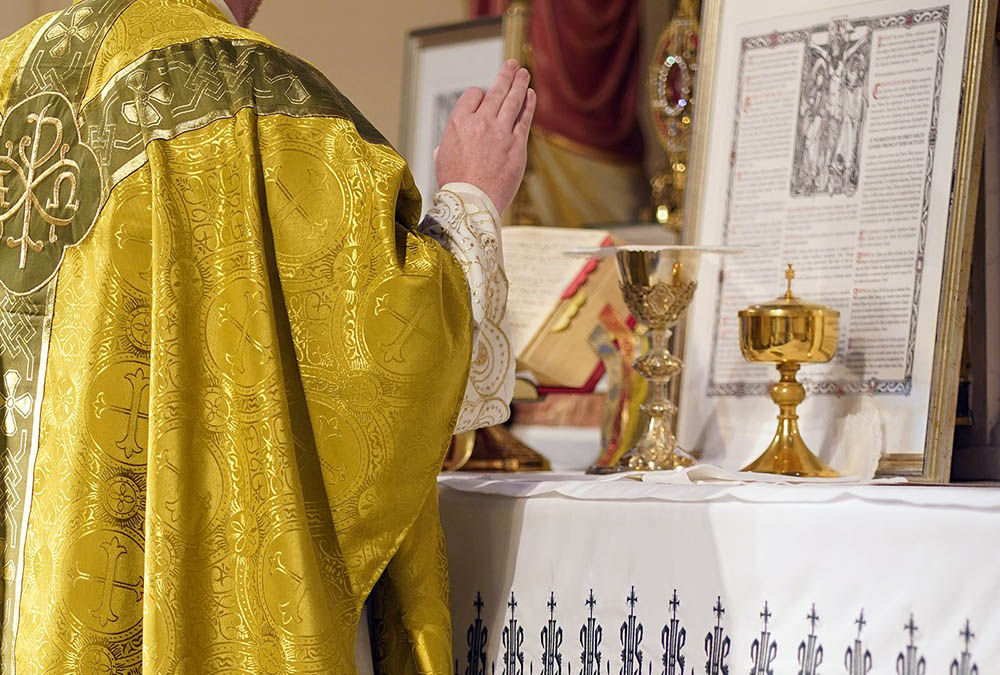
A priest prays during a traditional Latin Mass at St. Josaphat Church in the Queens borough of New York City. (CNS/Gregory A. Shemitz)
And The New York Times, which ought to know better, published a piece by National Review senior writer Michael Brendan Dougherty, titled "Pope Francis Is Tearing the Catholic Church Apart." Dougherty writes: "Pope Francis envisions that we will return to the new Mass. My children cannot return to it; it is not their religious formation. Frankly, the new Mass is not their religion."
Clearly, the opponents of Francis are eager to prove his point.
But the problem goes beyond dissent. The issue is not, fundamentally, that traditionalists question Francis' authority or push back against a decree they find excessive. A certain amount of questioning and pushback should always be welcome in any healthy faith group.
These communities aren't just standing up for traditional liturgy and the aesthetic glories of the European church tradition. They also sincerely believe that the Western European tradition is fundamentally superior. On that basis, they routinely defend acts of violence such as the crusades, which they see as "Holy Wars." Google "defense of the inquisition" and an array of articles will appear — mostly from traditionalist Catholic sites.
Traditionalists will argue that the imperialist colonization of non-European cultures, by violent and rapacious European invaders, was justified because they were "evangelizing" those cultures. Consider Declan Leary's recent and appalling article about the mass graves of indigenous children discovered on the sites of Catholic residential schools in Canada.
Leary's take on the graves? "They're good, actually." Because, apparently, those kidnapped children at least were baptized into the church before they died miserably in captivity. In his view: "Whatever sacrifices were exacted in pursuit of that grace — the suffocation of a noble pagan culture; an increase in disease and bodily death due to government negligence; even the sundering of natural families — is worth it."
Many traditionalists also appear to have a soft spot for the Confederate slave states. In 2017, the far-right traditionalist platform Crisis published a piece by Peter Maurice, "Robert E. Lee's Visage Becomes a Target of Mob Protests," in which he laments the removal of Lee's statue in New Orleans as "iconoclasm."
These communities aren't just standing up for traditional liturgy and the aesthetic glories of the European church tradition. They also believe that the Western European tradition is fundamentally superior.
And in 2017, Franciscan University professor Anne Hendershott published a piece in The Washington Times titled "First they came for the Confederacy," grotesquely appropriating Martin Niemöller's somber postwar reflection on the Holocaust to defend the statues of white supremacists. I encountered Confederate sympathizers myself, back in my traditionalist days: My initial introduction to the Tridentine Mass was via a professor who expressed his admiration for Jefferson Davis.
In short, many traditionalist communities are breeding grounds for white supremacy, and the host of evils that often accompany it: misogyny, anti-Semitism, homophobia, and abusive or manipulative uses of religion. One need only glance at popular far-right Catholics on Twitter to see the toxicity and prejudice that, in these circles, is not only tolerated but applauded.
It is erroneous to imagine that the problems in these communities can be dealt with simply by removing access to their preferred liturgy. Liturgy is catechesis, yes, but not all those who prefer the Tridentine liturgy automatically adhere to authoritarian and clerical religious ideals. Many progressive Catholics also appreciate the traditional Latin Mass.
Collin (who prefers that his last name not be shared due to reasons of privacy) identifies as a leftist, politically. He also loves the traditional Latin liturgy.
"I don't speak Latin, nor am I particularly inclined towards learning it," Collin shared. "So, beyond the homily, I am engaging with a language which appears to me in trickles and flashes rather than as a steady stream of comprehension. This alienation from direct meaning, paired with the priest's reverential position facing the tabernacle and away from the parishioners, creates a space in which engagement isn't focused on language but on silence. A space with linguistic/interpretive silence paired with ritual devotion is a very holy place."
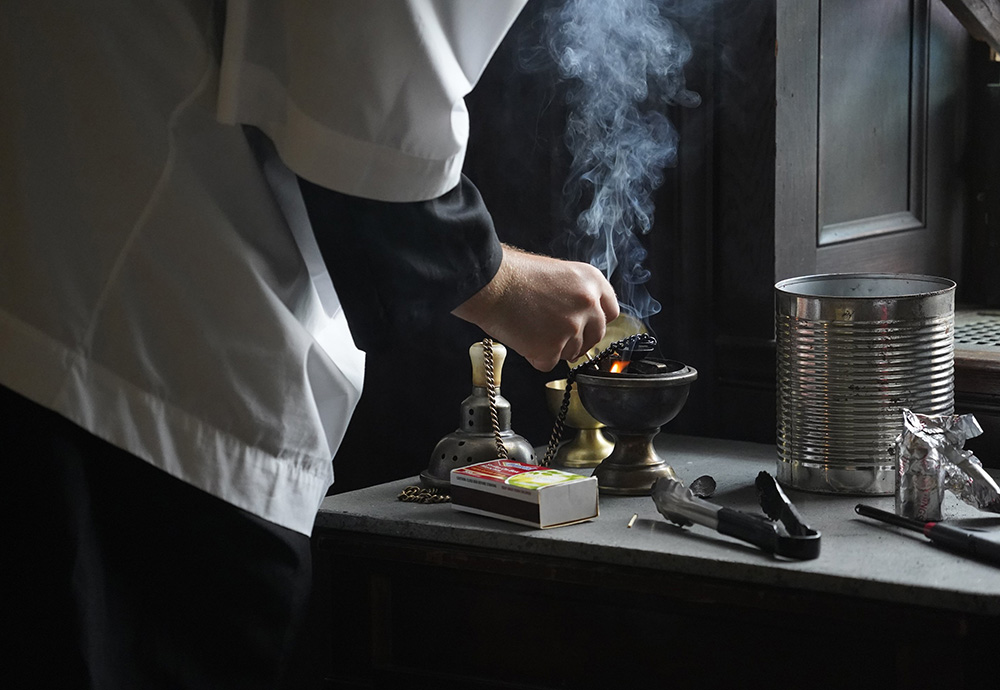
An altar server prepares a censer for use during a traditional Latin Mass at Immaculate Conception Seminary in Huntington, New York. (CNS/Gregory A. Shemitz)
Collin found the homilies at traditional parishes to be less elevating, however. "The homily at the traditional Latin Mass, delivered in English and typically with a reactionary political agenda, is jarring and discordant. I have interacted with people and priests who are [traditional Latin Mass] devotees, and I have, unfortunately, been on the receiving end of unsolicited, reactionary political screeds which were delivered, in my opinion, outside of the spirit of charity."
Claire Rogel identifies as "thoroughly liberal but apolitical," and has a deep appreciation for the Tridentine Mass: "The beauty, the timeless music, the theological richness of the texts, a congregation who cared about such treasures! This beautiful thing, utterly unlike anything in the secular world, was my heritage as a Catholic."
For Rogel, however, attending a traditional liturgy ended up coming with a cost. "The people were a little intense but very welcoming, really knew each other in a small parish way. It took time for me to see what was beneath the surface."
Rogel shared several dismaying experiences she had with the other Latin Mass devotees, including uncalled-for comments on the skin color of a waiter, and jokes about the murder of gay men. At the parish Palm Sunday luncheon, she reported, a fellow parishioner lamented that Catholics no longer "throw rocks at Jews during Holy Week."
Catholics who embrace leftist or progressive political values but prefer the Tridentine rite often have to grapple with this experience of being morally out of place among their fellow worshippers at traditional parishes.
Latin Mass worshippers are a more diverse group than many realize. We do need to detach traditional liturgical practices from their association with false and immoral ideologies such as white supremacy, though.
Peter Hardy loves the Latin Mass but can understand why Francis is opting to restrict it. "I have attended the extraordinary form Masses as my main Sunday Mass in three different places I've lived over the last decade," Hardy said. "I am also very progressive both politically and theologically, to the point to which I created, and used to run, the 'Progressive Catholics' Facebook group. I think that the pope's decision was brave and correct, especially in the light of the pandemic and the polarization in the U.S."
Hardy continued: "While I would prefer if the [extraordinary form] Mass was more inclusive of women (and for our present hygiene needs, that it permitted Communion on the hand), I do not reject anything about the liturgy itself (indeed I love it, especially the music). Nor do I get the impression that the Holy Father rejects anything about the liturgy. The problem is the divisive culture that has grown up around it, which separates the congregants from participating in parish life, and indeed, from the post-conciliar church, which many of them reject at least implicitly by rejecting its teachings on the dignity of all human life and on salvation for non-Catholics."
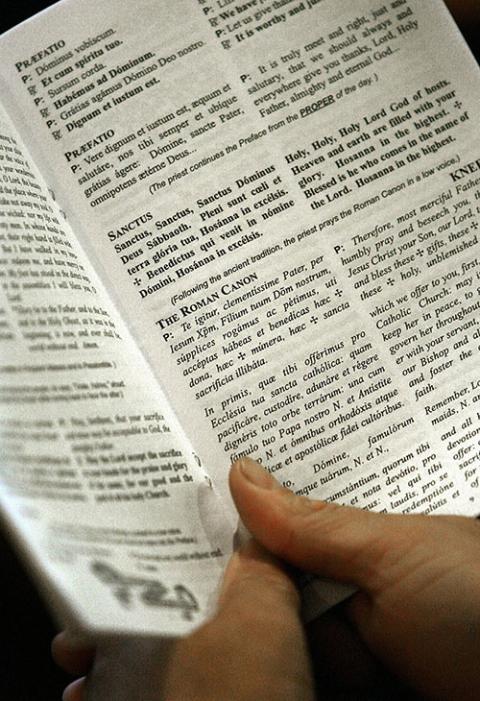
A parishioner holds a program during a Tridentine Mass at St. Therese Church in Collinsville, Oklahoma, Sept. 14, 2007, the day expanded use of the Latin Mass as authorized by Pope Benedict XVI went into effect. (CNS/Eastern Oklahoma Catholic/David Crenshaw)
Nevertheless, it would be erroneous to assume that progressive values are somehow at odds with what the traditional liturgy expresses, theologically. And some leftists can even find a little common ground in traditionalist circles. Mary-Catherine Croshaw is a leftist and radical feminist who prefers the Latin Mass because she finds it more reverent.
"Every major religion has a liturgical language that is used for worship (Arabic for Islam, Hebrew for Judaism, Sanskrit for Hinduism, Old Church Slavonic for the [Eastern Orthodox]) and I feel that just the use of a liturgical language, which, with the exception of Arabic, are not usually vernacular languages, reminds you of the importance of what's going on and sets it apart from your everyday life. I also find the traditional Latin Mass much more aesthetically pleasing, which might be a shallow reason, but nonetheless it makes a difference for me."
While in general she keeps her religious views and her political views separate, she has, surprisingly, discovered some overlap between her radical feminism and traditional Catholicism. "It's amazing how much radical feminist thought, and traditional Catholicism have in common — strong opposition to birth control, viewing casual sex as something that objectifies and demeans women, being critical of 'sex positivity.' I've definitely become stronger in those beliefs as I've become more immersed in Latin Mass circles, so maybe there's a connection there."
Clearly, love and even preference for the old Latin Mass should not be regarded as something exclusive to those who hold divisive and bigoted beliefs. And traditional Latin Mass worshippers are a more diverse group than many realize.
We do need to detach traditional liturgical practices from their association with false and immoral ideologies such as white supremacy, though. The Tridentine rite is one of many liturgical rites in the church's rich and diverse tradition and should not be denied to those who are deeply committed to a sacramental view of creation and a Gospel understanding of our role in the church and the human family.
It would be far better to be overt about what the problem is, and clearly condemn the bad ideologies that traditionalist groups promote.
Yes, the church already has condemned racism. Yes, it has condemned nationalism and anti-Semitism and hatred. But I think Francis would do well to take these general teachings and apply them in his dealings with the communities that flout them.
Advertisement
What if, instead of restricting the traditional rite according to the discretion of a bishop, the pope were to set up specific guidelines for any parish interested in celebrating the old rite? If a parish truly is committed to the teachings of the Gospel and the universality of Catholicism, they should live it out.
One way they could do so would be to implement anti-racism programs in their parishes, following the example of other parishes that have done so. They could hire Black speakers who address issues of racial justice.
They could also make a point of rejecting gender inequality by having inclusive Masses with women lectors and servers, rather than turning liturgy into a celebration of patriarchal power.
Pastors who want to preside over traditional liturgy should also be encouraged to preach on social justice. These parishes should give financial support to programs that house and feed the less fortunate.
To combat the evil of homophobia, they could promote outreach programs to LGBTQ persons who have felt shunned and rejected by their faith communities.
If I could send one short message to Francis regarding this controversy, it would be this:
Don't crack down on the old Latin Mass. Instead, crack down on those anti-Christian and anti-Gospel ideologies that have unfortunately come to be associated with it.

